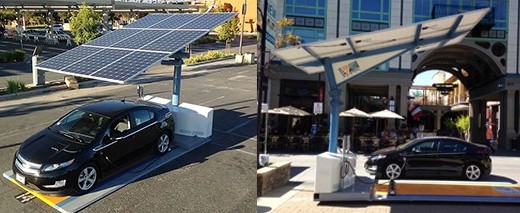Solar Electric Vehicle Charging – It’s Happening
Electric vehicles (EVs) are still a small percentage of the U.S. automobile market (annual registrations for EVs totaled 367,000 in April 2019) but annual sales of electric vehicles are expected to exceed 3.5 million vehicles in 2030. The growth is based on a number of factors such as the decline in battery prices and the fact that the upfront purchase price of an EV is predicted to reach price-parity with internal combustion engine vehicles by the mid 2020s. By 2022, in fact, there will be more than 500 different EV models available globally.

Electric vehicle charging infrastructure has always been one sticking point for electric vehicle ownership; in other words, the lack of access to charging where and when it is needed. However, it is changing. For a long time, powering electric vehicles meant plugging into an outlet at home or utilizing a charging station connected to the grid. The environmental benefit is dependent on how the local utility generates electricity. Now, solar power electric vehicle charging is making EV charging cleaner and more readily accessible.
Stan Cross, Brightfield Transportation Solutions Co-Founder and Southern Alliance for Clean Energy Electric Transportation Policy Director, describes some of the financial benefits of this EV charging:
“Integrating solar canopies and EV charging adds a solar production revenue stream that lowers the total cost of EV charging station ownership and provides access to the federal solar investment tax credit, which can offset system costs upwards of 60 percent.”
Companies Offering Solar EV Charging
The NC Clean Energy Technology Center has worked with three different solar electric vehicle charging companies that offer solar charging – iSun Energy, Envision Solar International, and Brightfield Transportation. This article describes the three companies and their solar EV charging methods. The companies vary in how they provide this service.
iSun Energy is a Canadian and American company founded in 2011 by CEO Sass Peress. The company has a line of solar power shading systems for residential (iSun Oasis) and commercial (iSun Palm) applications. Each product features an aluminum canopy structure which holds a solar panel array that captures and delivers power. The canopy’s functionality may be expanded with an EV charger that connects directly to an electrical grid. Getting a city permit for its use is easily obtained since it is considered a temporary structure.
In 2019, iSun Energy partnered with Northern Reliability, a Vermont company who delivers smart connected battery systems. This collaboration added stand-alone capability to iSun Energy’s solar canopy product. Northern Reliability’s experience with customizable battery systems and iSun’s solar canopy structure enabled the stand-alone solar electric vehicle charging product.
Envision Solar, located in San Diego, California, is headed by Desmond Wheatley. Envision Solar builds stand-alone, portable, solar powered EV chargers. Cities have embraced Envision Solar’s product because they want to accelerate off-grid EV charging without reducing available parking. The Envision Solar product works as follows. Solar arrays are on the top of the charging port while electronic equipment is below; a car pulls onto the platform and plugs into a battery charger, which provides level 2 or DC fast charging.
Envision Solar CEO Desmond Wheatley describes his product as follows:
“The EV Autonomous Renewable Charger is the only 100 percent renewal energized, grid independent EV charging solution. It is transportable and fits inside a standard parking space without reducing available parking.”
Envision Solar’s biggest client is New York City, which has 2,000 electrical vehicles. The stand-alone portable charging system avoids expensive and time consuming construction and permitting activities for EV infrastructure, an important feature in this dense city. Right here in North Carolina, the City of Greensboro has deployed two Envision Solar EV chargers for public use in the downtown. And, the City of Charlotte purchased four solar powered EV charging stations for public and city use. In both cases, the chargers, along with four others (one in Orange County and three at Accesso in Durham), were funded with a Clean Fuel Advanced Technology (CFAT) grant through the NC Clean Energy Technology Center. Wheatley notes that “citizens and city EV fleet operators don’t have to worry about being grounded when blackouts happen.”
Finally, Brightfield Transportation is the third company that provides solar energy EV charging. The company began in 2009 and took off after receiving a grant from the N.C. Department of Commerce’s Green Business Fund as part of the American Recovery and Reinvestment Act. Since that time, Brightfield has partnered with Nissan North America, EVgo, and the Clean Fuel Advanced Technology Fund to deploy 18 DC Fast Chargers across North Carolina and eastern Tennessee.
What is the Future of the Industry?
When asked about the future of the solar powered EV charging industry, iSun Energy CEO Sass Peress offers the following.
“It has evolved much since it was first launched by General Motors in 2010 in concert with the launch of the Volt. While few companies have found ways to be profitable in the sector, we believe the only way is for the systems to grow beyond simple EV charging and provide other services to fleet operators that allow for the business models to evolve and flourish. Off-grid systems have been laden with problematic shortages of power at key moments while grid-tied systems often have complex installation processes. We believe that modularity, scalability and resiliency are critical factors that future fleet decision-makers will be seeking”.
It’s very clear that solar-powered electric vehicle charging has an exciting future as automobile dealers bring more EVs online, EV charging expands, and customers look for fast, off-grid charging.
The NC Clean Energy Technology Center will be available and ready to assist as this exciting technology takes off. Contact Rick Sapienza for more information.